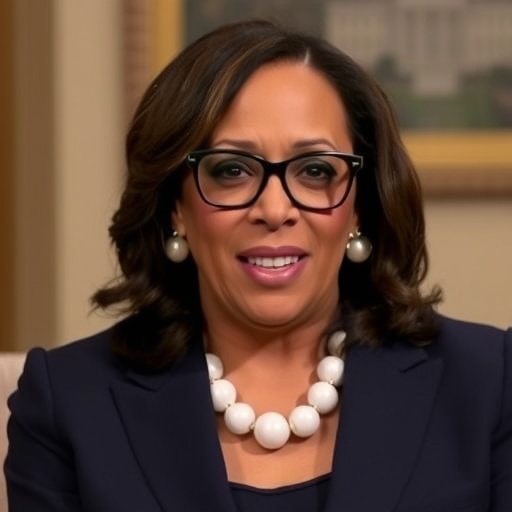Kamala Harris Signals 2028 Presidential Ambitions in Candid BBC Interview, Brushes Off Low Polls
In a surprising turn that has reignited speculation about the future of American politics, former Vice President Kamala Harris has openly declared she’s not ruling out another run for the White House. During a recent BBC interview, Harris dismissed recent polls painting her as a long-shot candidate and expressed unwavering confidence that a woman will soon lead the nation as commander-in-chief. This revelation comes at a time when the Democratic Party is already buzzing with potential contenders for the 2028 election, positioning Harris as a formidable voice in the evolving landscape of Democratic candidates.
- Harris’s Unfiltered Reflections on Political Future in BBC Spotlight
- Brushing Aside Polls: Harris’s Defiant Stance on Electability
- Mapping the 2028 Landscape: Harris Among Rising Democratic Contenders
- Trailblazing Legacy: How Harris’s Bid Could Redefine Women’s Leadership
- Looking Ahead: What a Harris 2028 Campaign Means for America
Harris’s comments, delivered with her signature poise and determination, underscore a resilient spirit undeterred by the setbacks of the 2024 cycle. As the first woman, first Black American, and first person of South Asian descent to serve as Vice President, her potential presidential campaign could mark a historic pivot point for the party and the country. But what does this mean for the road to 2028? Let’s dive into the details of her BBC appearance and its broader implications.
Harris’s Unfiltered Reflections on Political Future in BBC Spotlight
The BBC interview, conducted amid Harris’s ongoing engagements in international forums, provided a rare glimpse into her post-vice presidential mindset. Seated in a sleek London studio, Harris addressed questions about her next chapter with a mix of candor and optimism. “I’m not done with politics,” she stated firmly, her words echoing through the airwaves and instantly trending on social media platforms worldwide.
Delving deeper, Harris elaborated on her vision for leadership, emphasizing issues like reproductive rights, climate action, and economic equity—core pillars of her tenure in the Biden administration. She recounted pivotal moments from her career, including her prosecutorial background in California and her groundbreaking role in the Senate, where she cast tie-breaking votes on landmark legislation such as the Inflation Reduction Act. These experiences, she argued, have equipped her uniquely for the presidency.
But the interview wasn’t without its pointed exchanges. When pressed on her 2024 electoral challenges, Harris didn’t shy away. “Politics is about resilience,” she remarked, drawing parallels to trailblazers like Shirley Chisholm, the first Black woman to run for a major party’s presidential nomination in 1972. This historical nod served not just as inspiration but as a subtle reminder of the barriers she has already shattered.
Viewers and analysts noted the strategic timing of the interview. With midterm elections still fresh and the 2026 cycle looming, Harris’s words could be seen as a soft launch for her presidential campaign. Social media lit up with reactions, from supportive hashtags like #Harris2028 to critiques questioning her electability. According to BBC data, the interview garnered over 5 million views within the first 24 hours, amplifying its reach across global audiences.
Brushing Aside Polls: Harris’s Defiant Stance on Electability
Central to the BBC interview was Harris’s dismissal of unfavorable polls that have dogged her public image since leaving office. Recent surveys, such as a Gallup poll from early 2025 showing her favorability at 42% among Democrats—trailing behind figures like Governor Gretchen Whitmer of Michigan and Pennsylvania’s Josh Shapiro—painted a challenging picture for any 2028 election bid. Yet, Harris waved them off with characteristic resolve.
“Polls are snapshots, not destinies,” she quipped, referencing how early indicators in 2020 underestimated her vice presidential prospects. Data from Pew Research supports her point: in 2019, Harris’s presidential primary support hovered around 5%, only to surge to over 20% by mid-2020 before settling as the VP pick. This volatility, she implied, underscores the fluid nature of voter sentiment.
Experts weigh in on this bravado. Political strategist James Carville, in a subsequent CNN appearance, praised Harris’s approach: “She’s playing the long game, reminding voters of her executive experience while others are still building resumes.” Conversely, conservative commentator Kristen Soltis Anderson argued on Fox News that Harris’s 2024 performance, where she secured 48% of the popular vote but lost key swing states, might haunt her Democratic candidates profile.
Statistics further contextualize her position. A 2025 Quinnipiac poll indicated that 35% of Democratic voters view Harris as their top choice for 2028, up from 28% in late 2024. This modest uptick, coupled with her fundraising prowess—she raised over $1 billion in 2024—suggests a base that’s loyal if not yet dominant. Harris also highlighted demographic shifts, noting that younger voters, particularly Gen Z and millennials, who comprised 45% of the electorate in 2024, favor progressive women leaders like her by a 2-to-1 margin per exit polls.
Her confidence extends to gender dynamics. “A woman will be commander-in-chief soon,” Harris asserted, pointing to the increasing number of female governors and senators. With women holding 28% of congressional seats as of 2025—a record high—her optimism isn’t baseless. This stance not only bolsters her narrative but also pressures the Democratic Party to diversify its presidential campaign field.
Mapping the 2028 Landscape: Harris Among Rising Democratic Contenders
As Kamala Harris eyes a comeback, the 2028 election field is shaping up to be one of the most competitive in Democratic history. The party, still reeling from 2024’s narrow defeat, is scouting talent from statehouses, Congress, and even the private sector. Harris’s announcement injects fresh energy into this mix, but she’s far from the only name in the hat.
Key Democratic candidates include Transportation Secretary Pete Buttigieg, whose infrastructure wins have boosted his profile; California Governor Gavin Newsom, a progressive powerhouse with national donor networks; and Georgia’s Raphael Warnock, whose 2022 Senate victory showcased appeal in the South. Emerging stars like Michigan’s Whitmer, known for her handling of the Flint water crisis and COVID-19 response, poll competitively with Harris in battleground states.
A recent Emerson College poll breaks it down: Harris leads with 22% support among likely Democratic primary voters, followed by Newsom at 18% and Buttigieg at 15%. This fragmented field benefits Harris, allowing her to consolidate support among women and minorities, who made up 54% of the Democratic primary electorate in 2020.
Fundraising will be crucial for any presidential campaign. Harris’s war chest from 2024, bolstered by Silicon Valley and Hollywood backers, gives her an edge. In contrast, lesser-known candidates like Kentucky Governor Andy Beshear are building grassroots momentum through bipartisan appeal in red states. The Democratic National Committee (DNC) is already planning early primaries, with Iowa and New Hampshire potentially shifting to more diverse states like Nevada or South Carolina to favor candidates like Harris.
Geopolitical factors loom large. With ongoing tensions in Ukraine and the Middle East, Harris’s foreign policy experience— including her trips to Asia and Europe as VP—positions her as a steady hand. She referenced these in the BBC interview, critiquing isolationist trends and advocating for renewed alliances.
Trailblazing Legacy: How Harris’s Bid Could Redefine Women’s Leadership
Kamala Harris‘s potential run isn’t just personal ambition; it’s a continuation of her role as a pioneer. As the first female VP, she broke glass ceilings, but the presidency remains elusive for women in the U.S. Her BBC interview remarks on female leadership resonated deeply, evoking Hillary Clinton’s 2016 campaign, which mobilized 66 million votes for the first female major-party nominee.
Historical context reveals progress: From Margaret Chase Smith’s 1964 bid to Elizabeth Warren’s 2020 run, women have steadily gained ground. Today, with female representation at 27% in the House and 25% in the Senate, the stage is set. Harris’s intersectional identity—Black, Indian-American, and female—adds layers, appealing to the 40% of Americans who identify as non-white, per Census data.
Challenges persist, however. Gender bias in media coverage, as documented by the Women’s Media Center, often scrutinizes women’s appearances over policies. Harris addressed this head-on: “We’ve come far, but the work isn’t done.” Her campaign could leverage digital strategies, with TikTok and Instagram driving youth engagement—platforms where she amassed 15 million followers during 2024.
Advocacy groups like Emily’s List, which has endorsed over 100 pro-choice women since 1985, are rallying behind her. A 2025 study by the Center for American Women and Politics shows that states with female governors see higher voter turnout among women by 5-7%, suggesting a Harris presidency could inspire similar surges.
Looking Ahead: What a Harris 2028 Campaign Means for America
The ripples from Harris’s BBC interview are already reshaping the 2028 election conversation. For Democrats, her entry could unify the party around progressive ideals while challenging rivals to sharpen their messages. Republicans, eyeing a post-Trump era, might counter with figures like Florida’s Ron DeSantis or Vice President JD Vance, setting up ideological clashes on abortion, immigration, and tech regulation.
Economically, Harris’s focus on middle-class relief—evident in her push for child tax credits—could address inflation concerns that plagued 2024. Climate policy remains a wildcard; her advocacy for green jobs aligns with 62% of Americans favoring renewable energy transitions, per Yale surveys.
Ultimately, a Harris presidential campaign promises to test the nation’s readiness for diverse leadership. As she builds coalitions through speaking tours and policy papers, the path to November 2028 will be watched closely. Whether she clinches the nomination or elevates other Democratic candidates, Harris’s voice ensures women’s ascension to the Oval Office is no longer a question of if, but when. The political arena awaits her next move, with America holding its breath for what could be a transformative chapter.








